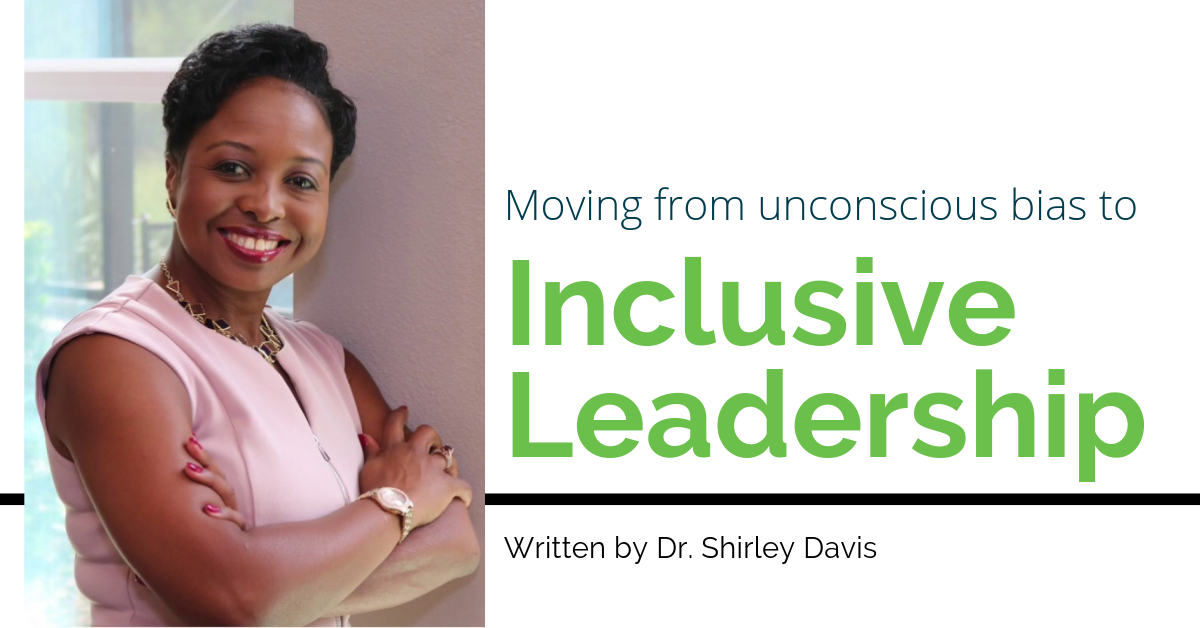
As written by Dr. Shirley Davis,
In the previous issue I explained that everyone has bias and that when left unchecked, it can have a negative impact on everyday interactions and decisions, particularly as leaders. I also suggested that simply being aware that we all have bias does not let us off the hook—that given a more global, diverse, multi-generational, and multi-cultural society, we have to practice inclusive leadership.
Simply put, this means that leaders must: 1) value diversity and work to foster a more inclusive workplace culture; 2) they need to develop new competencies, skill sets, and a new mindset for leading the workforce of today and in the future; 3) they must recognize that great talent comes in all shapes, sizes, colors, preferences, backgrounds, and ethnicities;and 4) they must embrace the reality that inclusive leadership is becoming the new normal and a key lever for attracting, engaging, and retaining top talent and for achieving competitive advantage, high performance, and business success.
Becoming an inclusive leader is not as easy as it sounds. It is much more than a title, giving a hug, and being nice. It requires intentionality. It demands a paradigm shift and openness to different ways of thinking and doing things. It means leaning in to some discomfort and demonstrating courage to embrace the unknown and the unfamiliar. These requirements of 21stcentury leaders are driven by the needs and expectations of the new generation of workers that will dominate the workforce and change the way the work gets done and the way that leaders lead.
For example, we already have five generations working alongside each other; nearly half of the global workforce is comprised of women; nearly 10,000 baby boomers are exiting the U.S. workforce every day and in the next fifteen years, Millennials will make up 75% of the workforce; 40% of the U.S. workforce today works part-time, remotely, and virtually; 60% of all degrees (from Associate to Doctorates) are now earned by women; and I could go on, but the heart of the matter is that amidst these demographic disruptors, the ability for leaders to lead across different work styles, world views, belief systems, time zones, communication styles, personality styles, and unique needs and expectations requires inclusive leadership.
It’s been said by Marshall Goldsmith that “what got you here, won’t get you there.” And that couldn’t be truer today. The leadership traits and competencies that were needed in the 20thcentury won’t work for the workforce of 2030. So what are they? Combined with my 20+ years of HR experience and certification as a leadership coach as well as the latest research on 21stcentury leadership, below is a list of common skills and competencies (not in any order). Review the list and take a personal assessment of how effectively you demonstrate each of these.
21st Century Leadership Competencies
The new generation of workers want leaders who connect with them, understand their individual needs, inspire them to grow and become better, treat them fairly and respectfully, and give them a sense of belonging and meaning at work. When leaders become more adept in demonstrating the competencies and traits that workers value in the workplace, they are building the kind of workplace culture that attracts top talent, increases engagement and productivity, fuels innovation and creativity, increases retention, and positively impacts the customer service experience. And most importantly, they are fostering a culture of inclusion and high performance that contributes to business success and long term sustainability.
To learn more about how Inclusive Leadership contributes to increasing employee engagement, job satisfaction, better employer brand, team performance, talent retention, and drives innovation, please take my new LinkedIn Learning course titled, “Inclusive Leadership”. It’s a must-have for all leaders.
About the Author
Dr. Shirley Davis is a well-respected thought leader and keynote speaker on the changing global workforce and culture transformation. She is the author of “The Seat: How to Get Invited to the Table When You’re Over-Performing and Undervalued.” Learn more about her at www.drshirleydavis.com